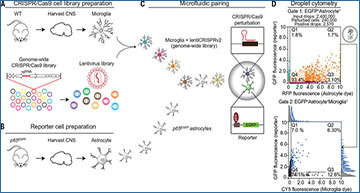Inflammatory neurological diseases, such as multiple sclerosis (MS), can arise when cell-to-cell communication between cells in the central nervous system (CNS) goes awry. But exactly how this cellular crosstalk leads to the molecular changes that drive disease remain unknown. To address this, researchers from Brigham and Women’s Hospital, a founding member of the Mass General Brigham health care system, developed a platform that allows them to perform genetic screens of cell-cell interactions to identify genes that control biologic processes.The new tool, known as systematic perturbation of encapsulated associated cells followed by sequencing, or SPEAC-seq, combines CRISPR-Cas9 and droplet microfluidics. Using this platform, the team studied interactions between two types of CNS cells-;microglia and astrocytes-;and identified a potential suppressor of disease-promoting astrocytes in preclinical models of MS and in clinical samples.
“SPEAC-Seq allows the high-throughput and systematic identification of cell-cell communication mechanisms. There are many potential applications for this platform, such as combining it with epigenome or transcriptome analyses to identify therapeutics that could change cell-cell interactions. We look forward to exploring these possibilities in the future.”
Source – Brigham and Women’s Hospital
Wheeler MA, Clark IC, Lee HG, Li Z, Linnerbauer M, Rone JM, Blain M, Akl CF, Piester G, Giovannoni F, Charabati M, Lee JH, Kye YC, Choi J, Sanmarco LM, Srun L, Chung EN, Flausino LE, Andersen BM, Rothhammer V, Yano H, Illouz T, Zandee SEJ, Daniel C, Artis D, Prinz M, Abate AR, Kuchroo VK, Antel JP, Prat A, Quintana FJ. (2023) Droplet-based forward genetic screening of astrocyte-microglia cross-talk. Science 379(6636):1023-1030. [abstract]





